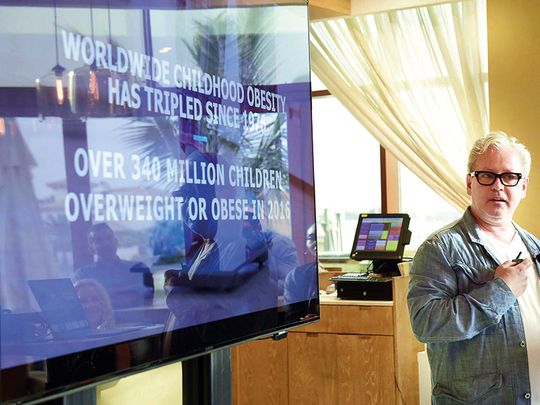
Dubai
Fitbit, the California-based maker of activity trackers, told Gulf News that the uptake of smartwatches is gaining more traction in the Middle East and African markets.
Vincent Lamoureux, director of new markets at Fitbit, said that the current stats show that the fastest growing segment is the smartwatch.
“Before smartwatch was just an extension of the smartphone and smart bands were tracking the fitness levels. Today, we do smart fitness smartwatches and change the way people see smart products. Now, you can call Uber with the watch. The smartwatches are more intelligent now,” he said after launching its new smartwatch Versa in the UAE.
In future, he said that smart bands will become smarter and people will still like to have the bands. The tracker has its future.
According to research firm International Data Corporation, the smart bands are expected to grow from 45 million units in 2017 to just 47.7 million in 2021 globally while smartwatches are expected to grow from 31.6 million in 2017 to 71.5 million in 2021.
The fastest growing category is the ‘earwear wearables’. This category excludes traditional Bluetooth headsets. It is expected to ship 1.7 million units in 2017 to 10.6 million units in 2021. The earwears are headphones that offer fitness tracking or audio augmentation and the elimination of 3.5mm headphone jack from smartphones will help fuel the growth.
Fitbit has been number one for the past couple of years, but last year Xiaomi has taken the number two position globally.
According to IDC, Fitbit is the third largest wearable maker globally with 13.3 per cent after Apple’s 15.3 per cent and Xiaomi’s 13.6 per cent for 2017.
“In pure volume terms, yes, Xiaomi has overtaken us but in value terms, Fitbit is in the range with Apple,” he said.
Lamoureux said that Fitbit remains the number one in downloaded health and fitness app on iOS and Android platforms, and the number one in the enterprise segment.
He said that EMEA is an important market for the company.
According to the company’s 2017 results, EMEA revenue grew 13 per cent to $440 million, other Americas revenue grew 6 per cent to $116 million, APAC revenue decreased 12 per cent to $115 million, and US revenue decreased 39 per cent to $944 million.
“MEA is one of the big markets for all smart wearable manufacturers. The future of GCC is great,” Lamoureux said.
The normal version of Versa watch is priced at Dh899 and the special edition is priced at Dh999.
He said the main difference between last year’s model Ionic and this year’s Versa is that Ionic was designed for 50 per cent men and 50 per cent women but it turned out to be 70 per cent men and 30 per cent women.
The more compact Versa is smaller and sacrificed on-board GPS compared to Ionic. The Versa connects to your smartphone’s GPS but Lamoureux said that most runners don’t want to map their tracks.
Because of the audience it is covering, he said that Fitbit launched elevated software for women. The software for women will be able to manage their periods.
“It logs data and correlate data points between menstrual cycle, sleep cycle, and other pieces of health data. It is helping to understand the period’s cycle under the data put by the user and detecting by the app. We are using the Versa to roll out the app, but it will also be available on Ionic soon,” he said.
He said that Fitbit has formed a venture with Dexcom, a company that creates continuous glucose monitoring (CGM) devices for people with diabetes. The first initiative is to bring Dexcom’s monitoring device data to Fitbit’s Ionic watch and develop other diabetes management tools in the future.
“The sensors are ready but the apps are coming. The first app to detect blood glucose using the sensor is called “One Drop”. It is accurate enough for a leisure use. You will see more apps coming into the Fitbit apps store in terms of pure health point,” he said.
Even though Versa and Ionic have NFC payments option, it is not available in the region. Only Samsung and Apple watches are able to do the payment option in the UAE.
“We are in talks with the banks as it is per country per bank and it is a tedious process. I have 40 countries to cover. It is likely that Fitbit Pay to be rolled out in the second half of the year. We are already connected to American Express, Visa and MasterCard. We are connected to Visa and MasterCard headquarters in Dubai,” he said.
Moreover, he said that payments via watches are one of the fastest growing features globally but it is not the same across the markets.
“Payment through smartwatch or smartphone is very sensible in the UAE but the time to take the phone out of my pocket and make it ready to pay is taking time rather than taking my credit card to make a payment. With the watch, it takes only less than four seconds to make a payment,” he said.
With most manufacturers coming out with LTE versions of smartwatches, Fitbit is not there yet.
When asked why he said: “we are not right there in our journey. We know that it is an option we can have but SIM cards are power hungry and reduce battery life. It can eat all of the battery in less than half a day. So it is not very friendly with fitness apps when you want to follow your health on a 24-hour basis. The Versa’s four-day battery life makes it the perfect bedtime companion,” he said.











